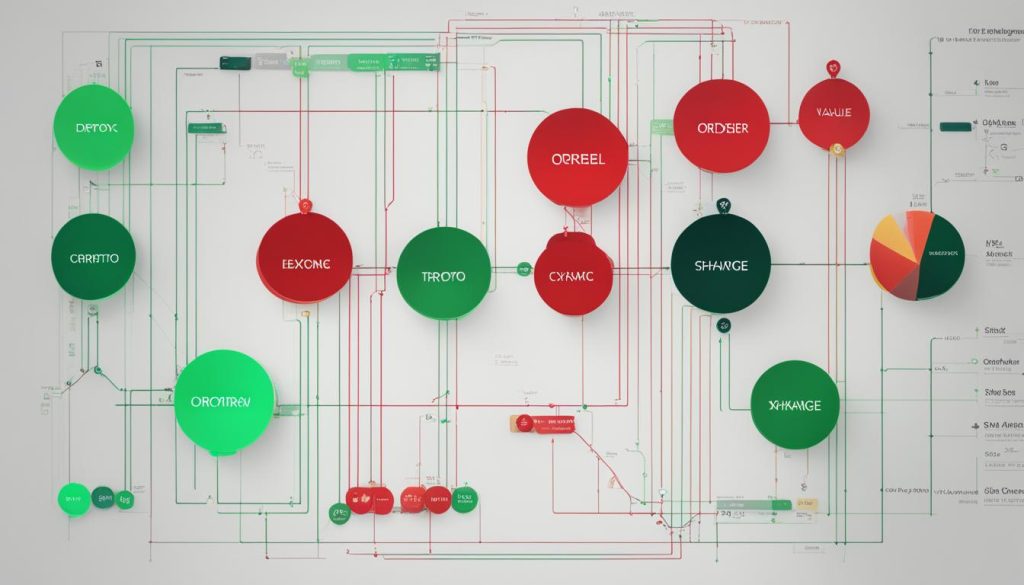Welcome to your comprehensive guide on decentralised crypto exchanges (DEXs) for trading BTC. As cryptocurrency continues to gain popularity, more traders are exploring alternative platforms that offer enhanced security, privacy, and control over their digital assets. In this article, we will delve into the world of DEXs, exploring their key functionalities, advantages, and limitations. Whether you’re new to crypto trading or a seasoned investor, this guide will equip you with the knowledge to make informed decisions in the exciting realm of decentralised finance.
Key Takeaways:
- DEXs operate on blockchain technology, enabling peer-to-peer trading of digital assets without intermediaries.
- Users maintain control over their funds and trade directly with other participants on the platform.
- Advantages of DEXs include enhanced security, greater privacy, trustless trading, and global access.
- Limitations of DEXs include lower liquidity, limited trading features, and technical complexity.
- By understanding the key functionalities and features of DEXs, traders can optimize their crypto trading experience.
Understanding Non-Custodial Trading on Decentralised Crypto Exchanges
Decentralised crypto exchanges (DEXs) offer users the ability to engage in non-custodial trading, granting them full control over their funds throughout the trading process. Unlike traditional exchanges where users deposit their funds into a centralized wallet, DEXs enable users to connect their personal wallets to the platform using wallet integrations like MetaMask or Ledger. This eliminates the need to trust a third party with custody of their funds.
By integrating their wallets directly with the DEX, users can maintain ownership and control of their digital assets. This non-custodial approach enhances security and reduces the risk of hacks or theft that can occur when funds are centralized. It also aligns with the core principles of decentralisation, empowering users to transact directly with each other without the need for intermediaries.
This control over funds is a significant advantage for users who value security and sovereignty over their assets. It eliminates the need to rely on a central authority, enabling individuals to execute trades and manage their funds autonomously. With non-custodial trading on DEXs, you can take full ownership of your assets and trade with confidence.

Advantages of Non-Custodial Trading:
- Enhanced security and reduced risk of hacks or theft
- Greater control and sovereignty over digital assets
- Elimination of the need to trust a third party with custody of funds
How to Perform Non-Custodial Trading:
- Choose a suitable decentralised crypto exchange (DEX) that supports non-custodial trading.
- Connect your personal wallet, such as MetaMask or Ledger, to the DEX platform through wallet integrations.
- Once your wallet is integrated, you can trade directly with other participants on the DEX without depositing your funds into a centralised wallet.
- Execute trades with confidence, knowing that you maintain full control over your assets throughout the trading process.
“Non-custodial trading on decentralised crypto exchanges empowers users with greater control, security, and autonomy over their funds.”
Exploring Peer-to-Peer Trading on Decentralised Crypto Exchanges
Decentralised crypto exchanges (DEXs) provide users with the unique ability to engage in peer-to-peer trading directly on the blockchain. Through the use of smart contracts, DEXs enable transparent and efficient transactions between buyers and sellers, eliminating the need for intermediaries. This peer-to-peer trading model brings several benefits to users, including increased transparency and a higher level of control over their trades.
One of the key advantages of peer-to-peer trading is the use of smart contracts. These self-executing contracts automatically execute trades when predefined conditions are met. By harnessing the power of blockchain technology, smart contracts ensure that trades are carried out securely and without the need for a centralized authority. This level of automation not only increases efficiency but also reduces the risk of fraud or manipulation.
The transparency provided by DEXs is another significant advantage of peer-to-peer trading. Since all transactions are recorded on the blockchain and accessible to the public, participants can verify the validity of trades and ensure that they are carried out as intended. This transparency fosters trust among traders and helps to mitigate any concerns regarding the integrity of the exchange.
| Advantages of Peer-to-Peer Trading on DEXs | Disadvantages of Peer-to-Peer Trading on DEXs |
|---|---|
|
|
“Peer-to-peer trading on DEXs offers users a new level of control and transparency in the world of cryptocurrency trading. By leveraging smart contracts and the power of the blockchain, DEXs empower individuals to trade directly with one another, without the need for intermediaries. This decentralized approach to trading brings a host of advantages, but it’s important to consider the potential limitations as well.”
While peer-to-peer trading on DEXs offers numerous advantages, it’s important to consider the potential limitations as well. Lower liquidity compared to centralized exchanges can make it challenging to execute large trades or find suitable counterparties for certain assets. Additionally, DEXs may have more limited trading features and require a certain level of technical knowledge for wallet management and transaction execution.
Overall, peer-to-peer trading on DEXs opens up new possibilities for cryptocurrency traders, enabling them to engage in secure and transparent transactions directly with other participants. By understanding the advantages and limitations of peer-to-peer trading, users can make informed decisions when navigating the world of decentralised crypto exchanges.
Understanding Decentralised Order Books on DEXs
Decentralised crypto exchanges (DEXs) rely on decentralised order books to match buy and sell orders. Unlike centralised exchanges that use a centralised order book, DEXs store order book information on the blockchain, making it accessible to all participants. This transparent approach to order matching allows for transparent price discovery and eliminates the need for a central authority.
Decentralised order books play a crucial role in facilitating peer-to-peer trading on DEXs. When a user places a buy or sell order, the DEX matches it with corresponding orders on the decentralized order book. The order is executed through a smart contract, ensuring a secure and trustless transaction. By leveraging blockchain technology, DEXs provide a transparent and open marketplace for digital asset trading.
To illustrate the concept of decentralised order books, let’s use an example:
“On a DEX, you want to buy 1 BTC at a specific price. The DEX’s decentralised order book contains sell orders from other participants who are offering to sell their BTC. The DEX matches your buy order with a corresponding sell order, ensuring that both parties agree on the transaction price. Once the transaction is executed, it is recorded on the blockchain, creating an immutable record of the trade.”
Decentralised order books provide several advantages. They enable transparent price discovery, as all participants can access and verify order book information. This transparency reduces the risk of price manipulation and promotes fair trading. Additionally, decentralised order books enhance the security of DEXs, as they eliminate the single point of failure that exists in centralised exchanges.

| Advantages of Decentralised Order Books | Disadvantages of Decentralised Order Books |
|---|---|
| Transparent price discovery | Lower liquidity compared to centralised exchanges |
| Reduced risk of price manipulation | Technical complexity for some users |
| Enhanced security through decentralisation | |
| Elimination of single point of failure |
In summary, decentralised order books are a fundamental component of DEXs, providing transparent price discovery and secure trading. While they offer advantages such as transparent marketplaces and enhanced security, they also have limitations such as lower liquidity and technical complexity. By understanding how decentralised order books work, users can make informed decisions when engaging in decentralised trading on DEXs.
Exploring Automated Market Making on DEXs
Decentralised crypto exchanges (DEXs) employ various mechanisms to provide liquidity and enable continuous trading for users. One widely used approach is automated market making (AMM), which relies on liquidity pools to facilitate trading without the need for traditional order books.
AMM works by allowing users to deposit their funds into liquidity pools, which are then used to provide liquidity for specific trading pairs. Liquidity providers (LPs) contribute their assets to the pool and earn fees based on the trading volume generated by their funds. This incentivizes LPs to ensure sufficient liquidity is available at all times.
Using mathematical algorithms, AMM platforms automatically adjust the price of tokens based on supply and demand dynamics. As trading activity increases or decreases, the algorithm calculates the optimal token price to maintain a constant ratio between the two assets in the trading pair. This enables users to trade assets at any time, without relying on the presence of other traders.
The use of liquidity pools and AMM algorithms has revolutionized decentralized trading by providing consistent liquidity and enabling continuous trading for various digital assets. This approach has also led to the rise of decentralized finance (DeFi) platforms, which leverage AMM mechanisms to offer a wide range of financial services, including lending, borrowing, and yield farming.
With the implementation of AMM, DEXs have become attractive alternatives to centralized exchanges, offering users continuous access to trading opportunities and liquidity without relying on traditional market makers or order book depth. However, it’s important for users to carefully consider the risks and drawbacks associated with AMM, such as potential impermanent loss and slippage, which can affect their overall trading experience.

Understanding Smart Contract Execution on DEXs
Smart contract execution plays a vital role in the operation of decentralized crypto exchanges (DEXs). Smart contracts are self-executing agreements stored on the blockchain, programmed to automatically execute trades when specific conditions are met. This ensures secure and trustless transactions on DEX platforms.
By utilizing smart contracts, DEXs eliminate the need for intermediaries or central authorities to facilitate and enforce trades. This decentralized approach enhances the security and transparency of transactions, as the execution of trades is governed by a pre-determined set of rules encoded within the smart contract.
Smart contract execution on DEXs offers several benefits to users. First, it eliminates the risk of funds being held by a third party, reducing the potential for hacks or theft. Instead, users retain control of their funds in their personal wallets until trades are executed. Additionally, smart contracts ensure that trades are executed only when all predefined conditions are met, providing a trustless environment for participants.
Overall, smart contract execution on DEXs enables secure and efficient decentralized trading. By leveraging the capabilities of blockchain technology, DEXs empower users to trade digital assets with confidence, knowing that their transactions are executed in a transparent and tamper-proof manner.

Examples of Smart Contract Execution on DEXs
Here are some examples of how smart contract execution is utilized on DEX platforms:
- Automated order execution: Smart contracts automatically match buy and sell orders based on predefined criteria, removing the need for manual order matching.
- Liquidity provision: Smart contracts enable liquidity providers to contribute their funds to decentralized liquidity pools, which are then used for automated market making.
- Token swapping: DEXs facilitate token swapping through smart contracts, allowing users to exchange one cryptocurrency for another without the need for an intermediary.
These examples highlight the versatility and efficiency of smart contract execution on DEXs, enabling a seamless trading experience for users across various digital assets.
Exploring Security and Privacy on DEXs
When it comes to decentralized crypto exchanges (DEXs), security and privacy are top priorities. With DEXs operating on blockchain technology, users can expect enhanced security compared to centralized exchanges. The inherent security features of the blockchain minimize the risk of hacks or theft from a centralized exchange.
One of the key advantages of DEXs is the control users have over their funds. Unlike centralized exchanges where users must deposit funds into a platform’s wallet, DEXs allow users to connect their personal wallets directly. This means that funds remain in the user’s wallet until trades are executed, reducing the risk of unauthorized access.
Additionally, DEXs often offer greater privacy compared to centralized exchanges. While centralized exchanges may require extensive identity verification processes, DEXs typically require minimal personal information. This means that users can trade with a certain level of anonymity, providing an added layer of privacy.
Table: Security and Privacy Comparison
| Security | Centralized Exchanges | Decentralized Exchanges |
|---|---|---|
| Fund Custody | Funds are held by the exchange | Funds remain in user’s wallet |
| Risk of Hacks | Higher risk due to centralized nature | Lower risk due to blockchain security |
| User Verification | Extensive identity verification | Minimal personal information required |
Overall, DEXs provide users with a secure and private trading experience. By leveraging the power of blockchain technology and allowing users to retain control over their funds, DEXs offer enhanced security compared to centralized exchanges. Additionally, the minimal personal information required by DEXs ensures greater privacy and anonymity for users. So, if security and privacy are important to you, consider exploring the world of DEXs for your crypto trading needs.

Understanding Open and Permissionless Access on DEXs
When it comes to decentralized crypto exchanges (DEXs), one of the key advantages is the open and permissionless access they offer to traders. Unlike traditional centralized exchanges that often have strict registration processes and impose geographic restrictions, DEXs allow anyone with a compatible wallet and access to the blockchain to participate in trading.
This open access means that individuals from all around the world can engage in peer-to-peer trading without the need for intermediaries or approvals. Whether you’re in Asia, Europe, Africa, or any other continent, DEXs provide a global platform for cryptocurrency trading.
This permissionless nature of DEXs also aligns with the core principles of blockchain technology, where trust is placed in the decentralized network rather than a central authority. By removing the need for permission or approval, DEXs empower users to take control of their own financial transactions and participate in the crypto market with greater freedom.

Benefits of Open and Permissionless Access
- Global Participation: DEXs enable traders from all parts of the world, regardless of location, to access the same trading opportunities. This global reach opens up new markets and increases liquidity.
- Financial Inclusion: DEXs provide an avenue for individuals who may not have access to traditional financial services to engage in trading and investment. This promotes financial inclusion by democratizing access to crypto assets.
- Reduced Counterparty Risk: With open access on DEXs, traders have the ability to directly interact with others on the network, reducing reliance on third-party intermediaries. This reduces counterparty risk and enhances trust in the trading process.
“DEXs create an open playing field for traders worldwide, fostering a more inclusive and equitable financial ecosystem.” – CryptoTraderMag
While open and permissionless access is a significant advantage of DEXs, it’s important to note that it also comes with certain considerations. Traders should be aware of the potential risks associated with decentralized trading, including the need to perform due diligence on counterparties and manage their own wallets securely.
| Advantages of Open and Permissionless Access | Considerations for Open and Permissionless Access |
|---|---|
| Global participation in the crypto market | Traders need to ensure the security of their wallets |
| Increased liquidity and trading opportunities | Due diligence required to mitigate risks associated with counterparties |
| Promotes financial inclusion and accessibility | Users must take responsibility for their own trading decisions |
In summary, open and permissionless access on DEXs provides a powerful avenue for global participation in the cryptocurrency market. It enables traders worldwide to engage in peer-to-peer trading without restrictions, fostering financial inclusion and reducing reliance on intermediaries. However, users must also be mindful of the risks involved and take necessary precautions to ensure the security of their funds and transactions.
Exploring Decentralised Exchange Features and Limitations

Decentralised exchanges (DEXs) offer a range of unique features that set them apart from their centralized counterparts. These features provide users with enhanced security, greater privacy, trustless trading, reduced counterparty risk, global access, and improved resilience. However, it’s important to be aware of the limitations that DEXs present, including potentially lower liquidity and limited trading features compared to centralized exchanges.
One of the key advantages of DEXs is their focus on security. By allowing users to maintain control of their funds in their personal wallets, DEXs eliminate the risk of hacks or theft that can occur on centralized exchanges. This increased security is further enhanced by the transparency and immutability of blockchain technology, which ensures the integrity of transactions.
While DEXs offer greater privacy than centralized exchanges by requiring minimal personal information, this emphasis on privacy can also result in lower liquidity. Centralized exchanges often have higher trading volumes and more active participants, which can lead to better liquidity and price stability. Additionally, DEXs may have limited trading features and user experience compared to their centralized counterparts, as they are still in the early stages of development and adoption.
Another limitation of DEXs is the need for users to have a certain level of technical knowledge for wallet management and transaction execution. Unlike centralized exchanges that provide user-friendly interfaces and support, DEXs require users to navigate and interact with the blockchain directly. This can be challenging for individuals who are not familiar with blockchain technology or who prefer a more user-friendly trading experience.
Table: Comparison of Decentralised Exchange Features and Limitations
| Features | Advantages | Limitations |
|---|---|---|
| Security | Eliminates risk of hacks or theft | Lower liquidity compared to centralized exchanges |
| Privacy | Requires minimal personal information | Limited trading features and user experience |
| Control | Users maintain control of their funds | Requires technical knowledge for wallet management |
| Global Access | Democratizes access to trading opportunities | Challenging for individuals unfamiliar with blockchain technology |
It’s important for individuals considering DEXs to weigh the benefits and limitations based on their specific trading needs and preferences. While DEXs offer advantages such as enhanced security and global access, they may not be suitable for everyone. Assessing the trade-offs between DEXs and centralized exchanges can help users make informed decisions and optimize their crypto trading experience.
Conclusion
In conclusion, decentralised crypto exchanges (DEXs) offer a secure and efficient way to trade BTC and other digital assets. By eliminating intermediaries and central authorities, DEXs provide users with greater control, privacy, and security over their funds. The key functionalities and features of DEXs, such as non-custodial trading, peer-to-peer trading, decentralised order books, automated market making, smart contract execution, security and privacy, open and permissionless access, interoperability, and user empowerment, contribute to their advantages.
However, it is important to note that DEXs also have their limitations. They may have lower liquidity compared to centralized exchanges and limited trading features. Additionally, users need a certain level of technical knowledge for wallet management and transaction execution. Despite these limitations, DEXs provide enhanced security, greater privacy, trustless trading, reduced counterparty risk, global access, and improved resilience.
When choosing a decentralised crypto exchange, it is crucial for users to consider their specific needs and preferences. By understanding the pros and cons of DEXs and evaluating their features, users can make informed decisions and optimize their crypto trading experience. Whether you are a beginner or an experienced trader, DEXs can offer a viable alternative for trading BTC and other digital assets in a decentralised and secure manner.
FAQ
What is a decentralized crypto exchange (DEX)?
A decentralized crypto exchange operates on blockchain technology and enables peer-to-peer trading of digital assets without the need for intermediaries or central authorities.
How do DEXs ensure control of funds?
Users connect their personal wallets to the DEX platform using wallet integrations like MetaMask or Ledger, eliminating the need to trust a third party with custody of funds.
How does peer-to-peer trading work on DEXs?
Buyers and sellers are connected directly, and trades are executed through smart contracts on the blockchain, ensuring transparency and immutability of transactions.
What are decentralized order books on DEXs?
Decentralized order books store buy and sell orders on the blockchain, allowing for transparent price discovery and order matching without relying on a centralized authority.
What is automated market making (AMM) on DEXs?
AMM mechanisms use liquidity pools provided by users to automatically adjust token prices based on supply and demand, enabling continuous trading and liquidity for various trading pairs.
How do smart contracts facilitate trading on DEXs?
Smart contracts, self-executing code stored on the blockchain, automatically execute trades once predefined conditions are met, ensuring secure and trustless transactions.
How do DEXs prioritize security and privacy?
DEXs leverage the inherent security features of blockchain technology, and since funds remain in users’ wallets until trades are executed, the risk of hacks or theft is minimized. DEXs also often require less identity verification and personal information.
Who can participate in DEXs?
DEXs are typically open and permissionless, allowing anyone with a compatible wallet and access to the blockchain to participate, democratizing access to trading opportunities globally.
What are the advantages of DEXs?
DEXs offer enhanced security, greater privacy, trustless trading, reduced counterparty risk, global access, and improved resilience.
What are the limitations of DEXs?
DEXs may have lower liquidity, limited trading features compared to centralized exchanges, and require users to have a certain level of technical knowledge for wallet management and transaction execution.

